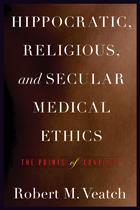The Hippocratic Oath is often assumed to be a timeless, if platitudinous, summary of the moral duties of members of the healing professions. In fact, it is a controversial code of ethics apparently developed for an ancient Greek cult having many of the characteristics of a mystery religion. It not only invokes pagan gods and goddesses, but also requires physicians not to reveal medical knowledge to patients, prohibits surgery by Hippocratic physicians, forbids abortion (but only by means of a pessary), and appears to authorize breaking confidentiality in certain cases (but not the ones required by many civil laws).
It is paternalistic; it states that what counts as a benefit is to be judged by the physician's judgment rather than the patient's. It does not require patient consent to treatment, has no notion of duties to the poor or needy, but does prohibit doctors from having sexual relations with slaves. In short, it is a bizarre, sometimes offensive, code of ethics. Moreover, it is metaethically odd that a professional group would claim authority to generate or articulate an ethical system.
There are some good alternatives available to guide relations between professional and patient. All the major religions have codes that require certain behaviours of their physicians and patients - sometimes behaviours incomprehensible to those outside those religions (such as rules about diet, prohibition on birth control, or duties not to treat the enemies of the king).
Also secular philosophical schools of thought, such as libertarianism, feminism, communitarianism, or liberal political philosophy, present systematic moral demands on their adherents. They may, for example, require informed consent or compassion for the poor. Since many health professionals are simultaneously members of these religious or secular traditions, the question arises of what someone should do when the Hippocratic code conflicts with these other moral claims.
Among religious sources of knowledge of moral norms, some rely on revelation. Both Karl Barth and Oral Roberts provide examples. For those committed to revealed religion, unique moral norms for the professions may be available that are comprehensible only to members of the group. In this regard, revealed religion is much like the Hippocratic ethic except that, in the case of the Hippocratic system, only members of the profession are part of the revelation. For those who accept some ways of knowing based in natural theology, knowledge of morality is more publicly accessible through reason and experience, both sources that provide a basis for conversation with proponents of secular ethics. Recent theories of "common morality" provide a possible basis for convergence of religious and secular sources of morality, but require incorporation of awareness of the fallibility of all moral epistemologies.
I argue that, in the face of these conflicts, it is irrational for physicians who are not members of the Greek cult to follow the Hippocratic ethic rather than the moral guidance of their religious or secular systems of belief and value. More importantly, it is irrational for patients, who cannot be members of the Hippocratic or any other professional group, to tolerate health professionals who claim to be practicing their profession based on a professionally generated code that puts forward moral views not acceptable to patients standing in some competing religious or secular tradition. I will hold out the possibility that religious traditions can be brought into harmony with some secular moral traditions and that these religious and secular traditions jointly provide a rational alternative to Hippocratic ethics.



